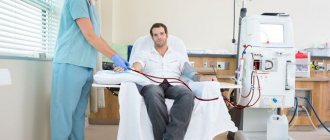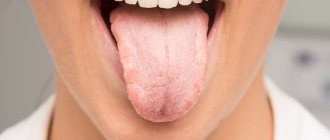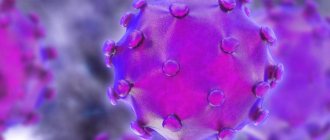Quite often, situations arise in people’s lives that unsettle them, when everything doesn’t go according to plan and doesn’t go well. A person becomes upset, he feels sad, sad, and believes that he is depressed. However, in most cases this is absolutely not the case. Only a doctor can diagnose depressive disorder.
What is depression, what are its causes, symptoms and treatment?
We will try to figure this out in our article.
What is depression?
Don't think it's just a bad mood or apathy.
If you have blues and despondency, this does not mean that there is depression. In fact, this is a disease that is characterized by serious changes in the biochemical processes of the human brain. Signs of the disease may persist for more than two weeks, while ordinary frustration or sadness disappears much sooner. In the absence of timely treatment for severe depression, the condition drags on for years and develops into an intractable chronic form. It often happens that a person does not even realize that he is sick. It is important to understand that treatment of neuroses and depression is necessary, this should be done by a specialist with extensive experience in this field. What is clinical depression , and why does it require treatment? The disease develops due to a disruption in the production of certain neurotransmitters in the brain, which are responsible for receiving positive emotions. The disease makes a person apathetic, he is rarely in a good mood, and most often has a pessimistic attitude.
Leave me alone, old lady, I'm depressed
"I am depressed!" - we habitually exclaim when something spoils our mood. This word in everyday conversations has long become synonymous with the concepts of “sadness”, “longing”, “sorrow”... However, depression is far from an ordinary phenomenon. This is a diagnosis that can only be made by a specialist - a psychiatrist or psychotherapist.
Depression is a mental disorder that includes three factors:
- low mood, anhedonia (inability to enjoy);
- impaired thinking (obsession with the cause of depression, negative judgments about all things, suicidal thoughts);
- physical inhibition (in some cases, up to a complete refusal to move - the person lies in his bed without getting up).
A person with depression is not able to adequately respond to support and reassuring phrases - he will simply let them pass by. Words: “Pull yourself together! Stop bitching! Get up and take action! - will not be beneficial, but will cause harm.
Do you think the patient behaves this way on purpose, to spite someone? In fact, he is well aware that something wrong is happening to him, but he cannot do anything about it. His psyche is unhealthy and needs help. But this help should come from a competent specialist. Home-grown “psychologists” will only aggravate the situation, and depression will enter an irreversible stage.
Does depression go away on its own? Alas, very rarely. Even if it seems that the disease has receded, the affected psyche will present an unpleasant surprise more than once.
Causes and symptoms
The reasons for the development of this disease can be regular stress, psychological trauma, various unpleasant situations and events, problems in relationships with loved ones, the opposite sex, psychological violence in childhood or adulthood. However, such a deviation in the psycho-emotional state is not only a consequence of injuries, it is also various changes at the physical level. In particular, patients have a lack of vitamin D, iron and some other microelements and biologically active substances.
In addition, the development of the disease is largely influenced by hormonal disorders and diseases of the endocrine system. Quite rarely, the disorder occurs as a side effect of taking medications, but this is usually prescribed in the instructions. Vitamin D deficiency is associated with a lack of sun; in the fall and spring, many people experience exacerbation of mental disorders.
How long will it take before I feel better?
It usually takes at least two to three weeks before your mood begins to improve under the influence of an antidepressant. Some medications take longer. For example, the effects of Prozac may take five to eight weeks to occur. It is not known why the effects of antidepressants may be delayed for so long (whoever finds out the reason has a good chance of being nominated for a Nobel Prize).
Many patients feel the urge to stop taking antidepressants before three weeks have passed because they feel hopeless and believe the medication is not working. This is counterintuitive because the active ingredients do not immediately produce results.
Will depression go away or is it forever?
If the disease lasts for a long time, many people begin to fear that they will never be able to get rid of it. Is it so? If the disease is mild, you can cope with it yourself. Sooner or later a person will experience a traumatic situation, reevaluate it, change his attitude towards the event and recover. In some cases, the use of medications leads to a bad mood, but after their withdrawal the condition returns to normal. Any psychiatrist, psychologist or psychotherapist will tell you that treatment for depression is necessary. This will allow a person to get rid of obsessive thoughts and gain more positive thinking, which will increase the quality of life, and possibly its duration.
Without treatment for depression in women and men, the disease will progress, exacerbating the psycho-emotional state and causing the development of mental disorders, especially for older people. But even for young people the disease does not go away without a trace. You shouldn’t fight it alone, share your problems with loved ones and friends, look at them from the outside, listen to advice, consult a doctor for treatment of panic attacks, moderate and severe depression.
- You can't convince me to get treatment
? - We will help you with motivation for treatment. As a rule, it is difficult for loved ones to persuade or force an addict to undergo treatment. World experts have developed EFFECTIVE motivation schemes, using which you can lead an addict to the decision to seek help. 8
Global trends
Since the early 2000s, the use of antidepressants has increased in almost all countries. In 2000, residents of Iceland were the most likely to use these drugs: 71 people out of a thousand admitted to regularly using them, and in 2011 this number increased to 106 people per thousand. In Canada and Australia, the figures are not much better: in 2011, 86 and 89 people out of a thousand, respectively, resorted to using medications against depression. The Scandinavians and other Europeans lagged behind, but not by much. Residents of Eastern European countries avoid taking antidepressants constantly, but often use them once (to be honest, this does not make much sense for health). Women are treated for depression more often than men, and bisexuals are treated more often than homosexuals and heterosexuals. For Russia, alas, there is no exact data.
Types of disorder
With the right methods, medications and treatment plan, the disease can be stopped and cured, regardless of the stage and duration of development. If the disorder is caused by the absence or deficiency of certain vitamins and substances in the body, the person’s condition will normalize as soon as the balance is restored. When treating endogenous or psychogenic depression, special complex therapy is required. In the first case, the disease is caused by a malfunction of the psyche, in the second – by traumatic events.
For example, an elderly woman can take the death of her husband to heart; the loss of a person with whom she lived hand in hand is very traumatic, which can cause the development of not only neuroses, but also dementia. In this case, doctors advise treating depression in women in a clinic.
Treatment for postpartum depression, which is very important for a young mother, is no less dangerous. During pregnancy and after childbirth, a huge number of changes occur in a woman’s body. Not everyone gets used to the new role right away; some are afraid of the oncoming responsibility; others are not confident in the support of their spouse. The result is mental disorder, panic attacks, unreasonable fears, breakdowns.
Today, specialists quite often treat bipolar depression. This disease is getting younger every year, but it should not be confused with a number of other abnormalities. Bipolar disorder is often confused with increased emotionality. If you feel the symptoms of this disease, call the clinic; today it is possible to both treat depression in a hospital in Moscow and undergo therapy on an outpatient basis.
Do you want to know about the cost of services?
8 call our specialist
Remission
The human psyche has an amazing property - it can self-heal as long as the body lives and breathes. With the right approach and treatment for depression, you can quickly learn to live and breathe again. At first hesitantly, then more and more confidently. Then the understanding will come that the “winter of the soul” was needed in order to bring spring and summer back into life, learn to listen to your heart, love simple things, smile at the sun and every new day, enjoy food and communication with your loved ones. Enjoy the little things that you simply didn’t have time for before. Love life in all its manifestations.
Source: posta-magazine.ru
Treatment of anxiety-depressive disorder without antidepressants
Many people do not want to see a doctor because they think that only drug treatment for depression with antidepressants is possible. They have heard about the side effects and high risk of developing drug addiction, as well as various myths about the dangers of these drugs. The dangers of antidepressants are greatly overestimated. Do not think that in modern medicine there are only drugs and pills for treating depression. Fearing often far-fetched consequences, people turn to homeopathy for help, which, naturally, will not give any result other than a placebo.
Today, there are completely different and varied methods of treating depression, and in many cases it is possible to do without medications. As a rule, pills are not even the basis of treatment, but maintenance therapy during psychotherapy. If you consult a doctor in a timely manner and begin effective treatment for depression in Moscow, you can do without medications.
Anonymous 24 hours a day Activity is licensed Patient accompaniment
Full range of narcology services:
- tests
- drug testing
- detox
- encoding
- psychiatry
- binder
- withdrawal symptoms
8+7
“I heard that antidepressants change personality. Will they turn me into a “zombie”?
This is perhaps one of the most common and most ridiculous myths regarding antidepressants. They won't actually change your personality. You will remain the same person, you will be able to work normally, communicate with people around you, you will live a full life - your mood will simply stabilize and become normal. A far-fetched “side effect” in the form of personality changes is not something to be afraid of. You won't become a zombie.
The most important thing is to correctly determine whether you have indications for taking antidepressants and choose the appropriate drugs and dosages. Only a specialist can competently solve these problems. Trust an experienced doctor at the Cordia Clinic, contact us:
How dangerous are antidepressants for the human body?
Are antidepressants dangerous to your health? People are as afraid of these drugs as they are of antibiotics. There are many myths around these medications. How dangerous are antidepressants really? First of all, you should understand that no doctor will prescribe you a potent drug without indications for it.
Modern medicines have a rather gentle effect on the human body, bringing great benefits to patients and bringing them closer to recovery much faster. The drugs affect the production of necessary neurotransmitters and compensate for the lack of serotonin and endorphins. As a result, within a couple of weeks the patient begins to feel many times better than before the start of therapy.
However, the positive effect of the tablets does not occur immediately; over the course of several weeks, the human body adapts, which is why some side effects occur. They often cause patients to stop taking medications because they feel like their condition is only getting worse. However, you should be prepared for the fact that these are not magic pills that will help you get rid of a serious illness overnight. Most medications have a cumulative effect.
A competent specialist knows in what dosages a particular drug should be taken. Most often, the dose is increased gradually, as the body gets used to it, which is why at the beginning of taking it the expected effect will be absent. It is important for patients to stay in touch with their doctor to inform him of any changes. If your health condition worsens, tell your doctor. If you follow the recommendations, the medications will only bring benefits and a significant improvement in your well-being.
How dangerous is taking antidepressants? What are the side effects?
Antidepressants cause some side effects. In drugs from different groups they are expressed to varying degrees. For example, SSRIs are the safest; most patients who take them do not experience any problems. At the same time, MAOIs can cause life-threatening side effects. They are incompatible with some types of medications and even food.
Unfortunately, the safest drugs are not always effective. In such cases, there is nothing left but to resort to “heavy artillery.” The doctor must carefully assess the patient's condition and prescribe the most appropriate medications in optimal dosages.
Sometimes in patients under 25 years of age, antidepressants increase suicidal tendencies, especially in the first weeks of use and when the dosage is changed. However, in the long term, they tend to improve mood and reduce the likelihood of suicide.
Antidepressant addiction – myth or truth?
It is impossible to say unequivocally that drugs for depression are evil. But also the fact that they are absolutely harmless. Medicine does not stand still, just like pharmacology. Medicines are constantly being improved and improved. Today, those medications that caused drug addiction and posed a real threat to health due to side effects are long gone. The latest generation of drugs is much safer than their predecessors.
In some cases, patients have to take medications for years, not because they become dependent, but because the treatment plan and indications require it. However, most often, when contacting specialists at an early stage of the disease, the use of drugs is not required, or a short course of treatment is required. The dosage is gradually reduced, which prevents the development of drug dependence. A person gradually gets used to living without medications.
However, the truth is that while most of these pills are banned from over-the-counter sales, some people circumvent the law and purchase them illegally. Why is this being done? The fact is that some drugs, when overdosed and used for a long time, can still be addictive. Some of the most common over-the-counter drugs include Lyrica and Fluoxetine (Prozac). When used for other purposes, for recreational purposes, the drugs can cause addiction, which can only be gotten rid of with the help of a narcologist.
You should not self-medicate, increase the duration of use and dose, this can lead to undesirable consequences and side effects. If you feel you cannot stop taking the drug, call your doctor. He can help you get rid of your addiction.
How do antidepressants work?
More recently, there was a boom in the worldwide craze for antidepressants, after which many people finally realized that the effectiveness of antidepressants is only 50%. This is due to the fact that the drug for depression is not suitable for all people; it largely depends on the person’s genotype.
Antidepressants only affect the symptoms of the disease, not the cause of the disease. Medicines for depression only return a person’s joy and desire to live, good mood, and help him adapt to society. After artificial recovery from depression with the help of antidepressants, it is necessary to undergo a course of treatment with a psychotherapist to identify and eliminate the cause of depression.
Is it possible to get rid of depression once and for all?
Is it possible to cure anxiety-depressive disorder? It is impossible to answer this question unequivocally in the affirmative. The disease can progress in different ways and have many concomitant diseases of varying severity. Each individual case should be considered individually. In most cases, depressive disorder can be treated, but the risk that the disease will return or remain permanently cannot be ruled out. It is very important to monitor any changes and, if necessary and if there is a visible deterioration in the condition, immediately contact a psychotherapist.
Following your doctor's recommendations and taking preventive measures will help you avoid relapse. You need to get into the habit of doing sports, physical education, or at least gymnastics in the morning. Remember that no one will take care of you except you. Forget about smoking and alcohol, bad habits only provoke the development of depression. It is also important to maintain a sleep schedule; sleep less than eight hours leads to negative processes in the central nervous system and has an undesirable effect on the psyche. Avoid stress as much as possible.
How can the doctor help?
There is a huge mistrust of doctors in our country. The rather low level of medicine in the regions, lack of funding, low salaries of doctors, and with it a negligent attitude towards work also have an impact. Of course, there are good and bad doctors and clinics; if you do not trust budget institutions, contact a private center.
If you have symptoms of the disorder, you should immediately contact a psychotherapist. A specialist will be able to quickly recognize the disease, carry out diagnostics and take tests, examine the patient and draw up an individual psychopharmacological treatment plan. Clinical psychologists at our center can also make a diagnosis of depressive disorder. Quite often our patients experience alcoholic depression due to prolonged abuse of alcoholic beverages. “Center for Healthy Youth” has all the capabilities, experience and necessary resources to eliminate all symptoms of the disease and normalize the psycho-emotional state of the patient.
Many people are afraid of psychologists. “Am I crazy?” – can often be heard from patients. However, neuroses and depressive states do not mean that a person is mentally ill, and he will be admitted to a mental hospital and registered. When contacting a private center, people are treated completely anonymously. Even if you go to a public clinic, you will not be registered at the dispensary. Specialists do not have the right to disclose the diagnosis or provide information about the patient’s condition to third parties, since this is a medical confidentiality. A person can go through the treatment process completely calmly. Quite often, an experienced doctor will only need to conduct psychotherapy sessions in order to achieve stable remission. Personal communication with a doctor and following his recommendations is all that is needed for a speedy recovery. You should not prescribe medications yourself, it can end badly.
If you feel increasing symptoms of depression, you should not wait for a miracle and live with it for years, there is a way out, modern techniques and the latest drugs will help you cope with the disease. Doctors will help you regain the joy of life even with chronic pathology.
Antidepressants in the practice of a neurologist: legal aspects
VEL 20.07.2020/1
“Higher, higher and higher...” - they sang in cheerful Soviet times about the successes of the proletarian aviation industry. Today, these poster words are not outdated - at least as a reminder of the increase in the number of mental disorders, in particular depressive episodes, in somatic patients.
The SAIL study (2006-2007) showed that 23.8% of patients in Russian non-psychiatric medical institutions have clinically developed depression, and 45.9% have subthreshold depression [1]. The START study (2013-2014) [2, 3] revealed clinically developed anxiety and depression in almost half of the patients (47% and 41%, respectively), and somatization*** and distress disorders**** - in 72 % and 76%. At the same time, less than 1/3 of patients agreed to specialized care [2]. In the overwhelming majority (and this is a global trend [4]), people avoid psychiatric diagnoses and prefer to communicate about their condition with neurologists and therapists [1, 5-7]
How legitimate is it to make a psychiatric diagnosis, for example, “depressive episode” (F32) and prescribe antidepressants by a neurologist?
Reading the laws
I. Law of the Russian Federation 07/02/92 N 3185-I “On psychiatric care and guarantees of the rights of citizens during its provision” [8]; National Health Project Primary Health Care Guidelines (2006) [9]: A general practitioner or neurologist may observe and prescribe treatment for a patient with subthreshold, mild, or moderate psychopathology .
II. Order of the Ministry of Health of the Russian Federation dated December 20, 2012 N 1175n [10]: the doctor has the right to prescribe adequate psychotropic treatment within the indications for prescribing specific drugs [15].
Legal comment: because when determining the circle of persons authorized to prescribe psychotropic substances, the doctor’s specialty is not mentioned - the rights and obligations to prescribe them apply equally to psychiatrists, neurologists, and therapists [11].
III. Order of the Ministry of Health of the Russian Federation dated January 14, 2019 No. 4n: antidepressants containing small amounts of psychotropic components and their precursors are prescribed on prescription form No. 107-1/u [12]
IV. Order of the Ministry of Health of the Russian Federation dated January 14, 2019 No. 4n: the prescription of drugs is carried out according to the INN, but in the presence of medical indications (individual intolerance, for health reasons), by decision of the medical commission, the prescription is carried out by trade names. [12]
***
Test yourself
You are seeing a patient with post-stroke depression (Patient Portrait No. 1). Do you have the right to prescribe him the antidepressant Velaxin® (venflaxin extended-release capsules), Fig. 1?
Fig.1. Velaxin capsules are a reasonable choice for the treatment of depression of any severity [13-15]
Answer
According to the law of the Russian Federation N 3185-I, orders of the Ministry of Health of the Russian Federation N 1175n and No. 4n, a neurologist has the right to treat moderate depression with the prescription of psychotropic drugs (antidepressants), prescribing them on form No. 107-1/u by trade name in the case of vital signs of the patient.
***
Literature
- Smulevich A.B., Dubnitskaya E.B., Drobizhev M.Yu., Burlakov A.V., Makukh E.A., Gorbushin A.G. Depression and the possibilities of their treatment in general medical practice (preliminary results of the SAIL program) // Consilium Medicum, 2007, volume 2, No. 2. // Mental disorders in general medicine, pp. 23-25
- Smulevich A.B. et al. Four-dimensional questionnaire for assessing distress, depression, anxiety and somatization (4DDTS) in vegetative psychosomatic disorders of the borderline level // Journal of Neurology and Psychiatry named after. S.S. Korsakova2014;114(11):67-73
- Terluin B. & ect. The Four-Dimensional Symptom Questionnaire (4DSQ): a validation study of a multidimensional self-report questionnaire to assess distress, depression, anxiety and somatization. BMC Psychiatry 2006; 6:34
- Wittchen HU, Jacobi F. Size and burden of mental disorders in Europe—a critical review and appraisal of 27 studies. //Eur Neuropsychopharmacol. 2005 Aug;15(4):357-76
- E.S. Akarachkova, O.V. Kotova. Use of psychotropic drugs by general practitioners: pros and cons. Neurology, special issue No. 1, 2021.
- Akarachkova E.S. On the issue of diagnosis and treatment of psychovegetative disorders in general somatic practice. // Attending physician No. 10 2010 p. 60-64
- Kotova O.V., Akarachkova E.S., Vershinina S.V., Ryabokon I.V. Sleep disturbances in patients with neurological diseases. Journal of Neurology and Psychiatry. CC Korsakova, 2013. T. 113. No. 12. P. 117-120.
- Law of the Russian Federation of July 2, 1992 N 3185-1 (as amended on November 28, 2015) “On psychiatric care and guarantees of the rights of citizens during its provision.”
- Guide to Primary Health Care. Team of authors. National project "Health". GEOTAR, 2006, 1000 p.
- Order of the Ministry of Health of the Russian Federation dated December 20, 2012 N 1175n, Moscow “On approval of the procedure for prescribing and prescribing medications, as well as forms of prescription forms for medications, the procedure for completing these forms, recording and storing them”: the doctor has the right to prescribe an adequate psychotropic treatment within the indications for specific drugs
- Akarachkova E.S. et al. Anxiety and its somatic manifestations in outpatients. Results of the All-Russian epidemiological study VEGA. Scientific and practical journal “Stress under control”, No. 1, 2021.
- Order of the Ministry of Health of the Russian Federation dated January 14, 2019 No. 4n “On approval of the procedure for prescribing medicines, forms of prescription forms for medicines, the procedure for completing these forms, their recording and storage”
- Instructions for medical use of the drug Velaxin. GRLS
- Mosolov S.N. Clinical efficacy and tolerability of venflaxin (Velaxin) in the treatment of moderate and severe depression. Difficult patient, November 2007.
- Ilyina N.A., Zakharova N.V. Velaxin prolonged action in the treatment of anxious depression in psychiatric practice. Mental disorders in general medicine, 2009.
Glossary
* Anxiety is groundless worry, anticipation of negative events, premonition of danger, impending disaster with a feeling of internal tension and lasting more than 4 weeks.
** Depression - decreased mood, loss of the ability to experience joy, disturbances in thinking in the form of negative judgments, a pessimistic view of what is happening, etc., as well as motor retardation, decreased self-esteem, loss of interest in life and usual activities.
*** Somatization is a pathomorphism of mental disorders (most often depression) with a predominant tendency towards the predominance of somatovegetative manifestations
**** Distress disorder is a disturbance of the emotional background, a maladaptive reaction of high intensity, which is the basis for the occurrence of mental and/or somatic disorders [6(11)].











